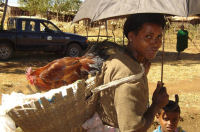The University of Liverpool has been awarded £700,000 to reduce the burden of poultry diseases in Ethiopia.
Poultry play an important economic, nutritional and socio-cultural role in the livelihoods of poor rural households in many developing countries, including Ethiopia, where they are an integrated part of the smallholder production systems and play a significant role in alleviating poverty. Poultry production is particularly important to women, who tend to own and manage chickens. The resulting income is often used to support education of children.
The study – a collaboration involving the International Institute for Livestock Research in Addis Ababa, the Ethiopian Institute for Agricultural Research, the University of Nottingham and the Roslin Institute – aims to identify the causes of infectious diseases which have a major impact on poultry production in Ethiopia. This will be linked with an ongoing poultry breeding programme in the country to improve resistance to these priority infectious diseases whilst enhancing productivity.
Dr Rob Christley, Head of Epidemiology and Public Health and Co-Director of the National Centre for Zoonosis Research at the University of Liverpool, said: “In Ethiopia, indigenous chicken varieties are well adapted to local environments but tend to grow slowly and produce fewer and smaller eggs compared to commercial stocks. Infectious diseases have a major impact and prevent this even limited genetic potential from being realised.
“Enhanced genetic resistance through selective breeding represents an under-exploited low cost opportunity for disease control in low input poultry production systems. We aim to develop a poultry breeding programme that enhances productivity, while improving resistance to diseases with the greatest threat to village poultry.”
Knowledge from this study will enable more precise disease control planning by Ethiopian policy makers and animal health professionals and will also provide a legacy of improved scientific capacity within Ethiopia, including training of local scientists and enhanced laboratory facilities for poultry testing.
The study, funded by the Biotechnology and Biological Sciences Research Council (BBSRC) and the Department for International Development (DFID), with a contribution from the Scottish Government, forms part of a £13 million project to tackle the significant and growing threat posed by livestock diseases to global food security and livelihoods in developing countries.
